unit7 topic1 知识点加答案
Unit7 Topic1 Section A
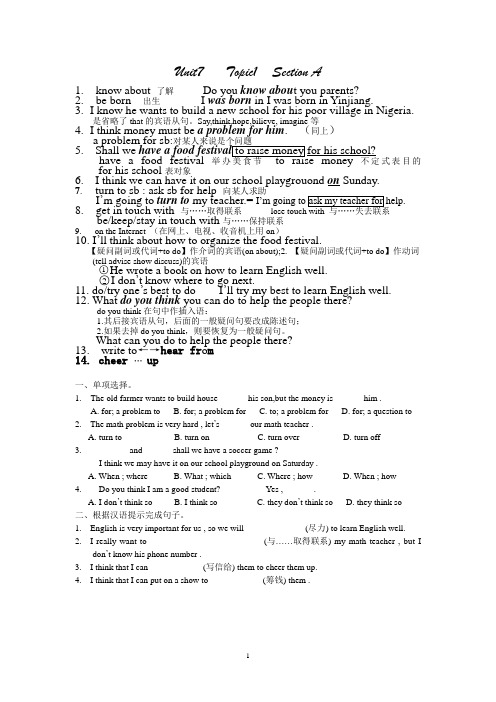
Unit7 Topic1 Section A1.know about 了解Do you know abou t you parents?2.be born 出生I was born in I was born in Yinjiang.3.I know he wants to build a new school for his poor village in Nigeria.是省略了that的宾语从句。
Say,think,hope,bilieve, imagine等4.I think money must be a problem for him. (同上)a problem for sb:5. Shall we to raise money for his school?have a food festival举raise money不定式表目的for his school表对象6. I think we can have it on our school playgrouond on Sunday.7. turn to sb : ask sb for help 向某人求助I’m going to turn to my teacher.= I’8.get in touch with 与……取得联系be/keep/stay in touch with与……保持联系9. on the Internet (在网上、电视、收音机上用on)10. I’ll think about how to organize the food festival.【疑问副词或代词+to do】作介词的宾语(on about);2. 【疑问副词或代词+to do】作动词(tell advise show discuss)的宾语○1He wrote a book on how to learn English well.○2I don’t know where to go next.11. do/try one’s best to do I’ll try my best to learn English well.12. What do you think you can do to help the people there?do you think在句中作插入语:1.其后接宾语从句,后面的一般疑问句要改成陈述句;2.如果去掉do you think,则要恢复为一般疑问句。
最新版仁爱英语八年级下册Unit7topic1重点知识点总结及练习--最新版
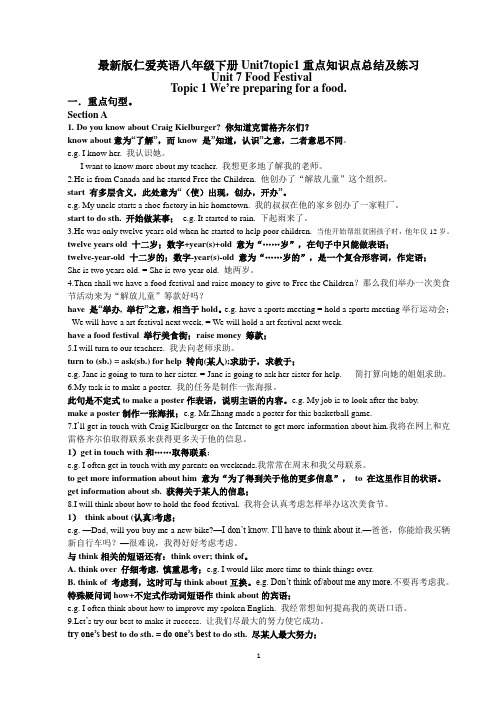
最新版仁爱英语八年级下册Unit7topic1重点知识点总结及练习Unit 7 Food FestivalTopic 1 We’re preparing for a food.一.重点句型。
Section A1.Do you know about Craig Kielburger? 你知道克雷格齐尔们?know about意为“了解”,而know 是”知道,认识”之意,二者意思不同。
e.g. I know her. 我认识她。
I want to know more about my teacher. 我想更多地了解我的老师。
2.He is from Canada and he started Free the Children. 他创办了“解放儿童”这个组织。
start 有多层含义,此处意为“(使)出现,创办,开办”。
e.g. My uncle starts a shoe factory in his hometown. 我的叔叔在他的家乡创办了一家鞋厂。
start to do sth. 开始做某事;e.g. It started to rain. 下起雨来了。
3.He was only twelve years old when he started to help poor children. 当他开始帮组贫困孩子时,他年仅12岁。
twelve years old 十二岁;数字+year(s)+old 意为“……岁”,在句子中只能做表语;twelve-year-old 十二岁的;数字-year(s)-old 意为“……岁的”,是一个复合形容词,作定语;She is two years old. = She is two-year old. 她两岁。
4.Then shall we have a food festival and raise money to give to Free the Children?那么我们举办一次美食节活动来为“解放儿童”筹款好吗?have 是“举办, 举行”之意,相当于hold。
仁爱版英语七年级下册Unit7 Topic1 【聚焦中考】:Unit7_Topic1_必考知识点汇编
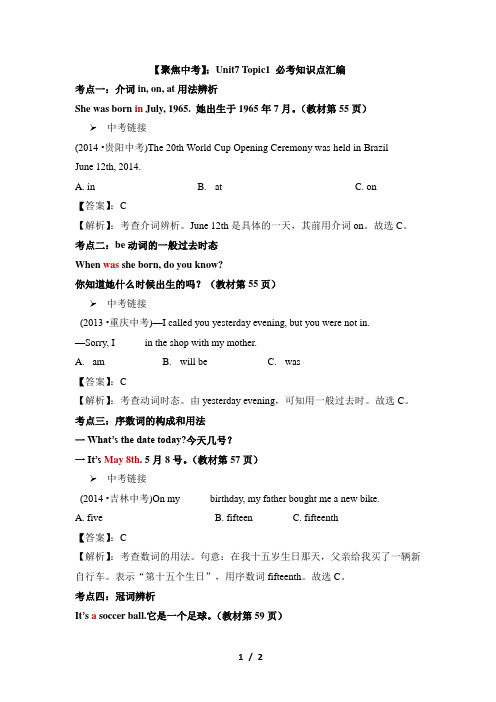
【聚焦中考】:Unit7 Topic1 必考知识点汇编考点一:介词in, on, at用法辨析She was born in July, 1965.她出生于1965年7月。
(教材第55页) 中考链接(2014 •贵阳中考)The 20th World Cup Opening Ceremony was held in Brazil ______ June 12th, 2014.A. inB. atC. on【答案】:C【解析】:考查介词辨析。
June 12th是具体的一天,其前用介词on。
故选C。
考点二:be动词的一般过去时态When was she born, do you know?你知道她什么时候出生的吗?(教材第55页)中考链接(2013 •重庆中考)—I called you yesterday evening, but you were not in. —Sorry, I _____ in the shop with my mother.A. amB. will beC. was【答案】:C【解析】:考查动词时态。
由yesterday evening,可知用一般过去时。
故选C。
考点三:序数词的构成和用法一What’s the date today?今天几号?一It’s May 8th. 5月8号。
(教材第57页)中考链接(2014 •吉林中考)On my _____ birthday, my father bought me a new bike.A. fiveB. fifteenC. fifteenth【答案】:C【解析】:考查数词的用法。
句意:在我十五岁生日那天,父亲给我买了一辆新自行车。
表示“第十五个生日”,用序数词fifteenth。
故选C。
考点四:冠词辨析It’s a soccer ball.它是一个足球。
(教材第59页)中考链接(2014•福州中考) Lin Dan is _____ excellent player. I’m ______ big fan of him. A. a; the B. an; a C. the; an【答案】:B【解析】:考查冠词的用法。
Unit 7 topic 1 重点知识点总结

Unit 7 Topic 1 Section A1.Do you know about Craig Kielburger? 你知道克雷格齐尔伯格?know about意为“了解”,而know 是”知道,认识”之意,二者意思不同。
如:I know her. 我认识她。
I want to know more about my teacher. 我想更多地了解我的老师。
2. He is from Canada and he started Free the Children. 他创办了“解放儿童”这个组织。
start有多层含义,此处意为“(使)出现,创办,开办”。
如:My uncle starts a shoe factory in his hometown. 我的叔叔在他的家乡创办了一家鞋厂。
start to do sth.开始做某事;如:It started to rain. 下起雨来了。
3. He was only twelve years old when he started to help poor children. 当他开始帮组贫困孩子时,他年仅12岁。
twelve years old十二岁;数字+year(s)+old 意为“……岁”,在句子中只能做表语;twelve-year-old 十二岁的;数字-year(s)-old 意为“……岁的”,是一个复合形容词,作定语;4. Then shall we have a food festival and raise money to give to Free the Children?那么我们举办一次美食节活动来为“解放儿童”筹款好吗?(1) have 是“举办, 举行”之意,相当于hold。
have a food festival =hold a food festival 举行美食节;如:have a sports meeting = hold a sports meeting举行运动会;(2) Shall I/we …? 在提供帮助、提出建议、要求给予和征求意见时,用Shall I/we …?句型,意为“我(们)……,好吗?”如:Shall I open the window? 我把窗户打开好吗?【链接】①May I …? 常用于征求对方的意见,意为“我可以……吗?”。
仁爱英语七年级下册unit7topic1知识点总结+练习
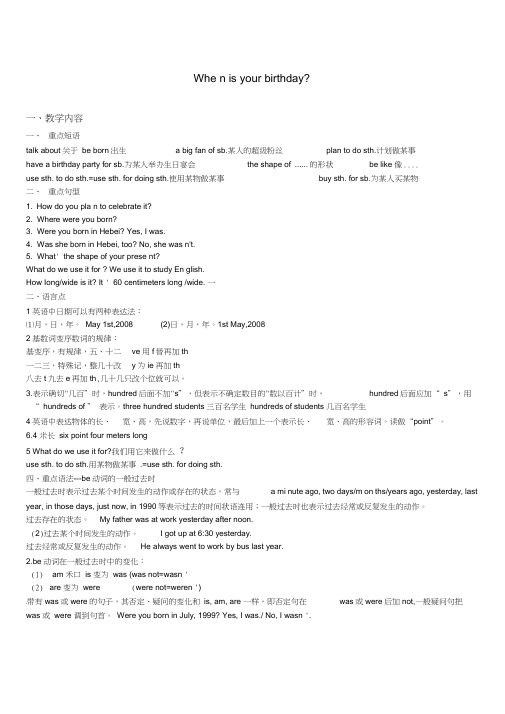
Whe n is your birthday?一、教学内容一、重点短语talk about关于be born出生 a big fan of sb.某人的超级粉丝plan to do sth.计划做某事have a birthday party for sb.为某人举办生日宴会the shape of ...... 的形状be like 像....use sth. to do sth.=use sth. for doing sth.使用某物做某事buy sth. for sb.为某人买某物二、重点句型1. How do you pla n to celebrate it?2. Where were you born?3. Were you born in Hebei? Yes, I was.4. Was she born in Hebei, too? No, she was n't.5. What' the shape of your prese nt?What do we use it for ? We use it to study En glish.How Iong/wide is it? It ' 60 centimeters long /wide. 一二、语言点1英语中日期可以有两种表达法:⑴月,日,年。
May 1st,2008 (2)日,月,年。
1st May,20082基数词变序数词的规律:基变序,有规律,五、十二ve用f替再加th一二三,特殊记,整几十改y为ie再加th八去t九去e再加th,几十几只改个位就可以。
3.表示确切"几百”时,hundred后面不加"s”,但表示不确定数目的"数以百计”时,hundred后面应加“ s”,用“ hundreds of ” 表示。
three hundred students 三百名学生hundreds of students 几百名学生4英语中表达物体的长、宽、高,先说数字,再说单位,最后加上一个表示长、宽、高的形容词。
最新版仁爱英语八年级下册Unit7topic1重点知识点总结及练习
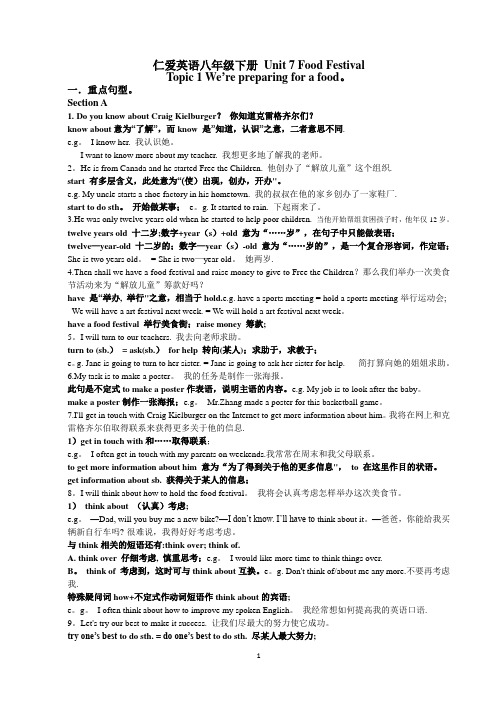
仁爱英语八年级下册Unit 7 Food FestivalTopic 1 We’re preparing for a food。
一.重点句型。
Section A1.Do you know about Craig Kielburger?你知道克雷格齐尔们?know about意为“了解”,而know 是”知道,认识”之意,二者意思不同.e.g。
I know her. 我认识她。
I want to know more about my teacher. 我想更多地了解我的老师。
2。
He is from Canada and he started Free the Children. 他创办了“解放儿童”这个组织.start 有多层含义,此处意为“(使)出现,创办,开办"。
e.g. My uncle starts a shoe factory in his hometown. 我的叔叔在他的家乡创办了一家鞋厂.start to do sth。
开始做某事;e。
g. It started to rain. 下起雨来了。
3.He was only twelve years old when he started to help poor children. 当他开始帮组贫困孩子时,他年仅12岁。
twelve years old 十二岁;数字+year(s)+old 意为“……岁”,在句子中只能做表语;twelve—year-old 十二岁的;数字—year(s)-old 意为“……岁的”,是一个复合形容词,作定语;She is two years old。
= She is two—year old。
她两岁.4.Then shall we have a food festival and raise money to give to Free the Children?那么我们举办一次美食节活动来为“解放儿童”筹款好吗?have 是“举办, 举行"之意,相当于hold.e.g. have a sports meeting = hold a sports meeting举行运动会; We will have a art festival next week. = We will hold a art festival next week。
仁爱8年级下册 Unit7 Topic1 重点句型

Unit7 topic1 重点句型Section A:1.He is from Canada and he started Free the Children.他来自加拿大,他发起了解放儿童运动。
(1)Start v.开始/创立/启动/启程①It started to rain. 下起雨来了start to do sth.②She started laugh ing. 她笑了起来star do ing sth.③He started work ing in a factory when he was only four.他四岁时就开始在一家工厂工作。
④The car won't start/work. 这辆车发动不起来(不工作了)⑤Start to do 表示:开始去做;start doing 表示:已开始在做(2)Start n.开头;开端;开始①Things didn't look too hopeful at the start of the year. 在年初,情况显得并不十分美妙。
②I want to make an early start in the morning. 我想早上早点出发2.F ree the Children has built over 700 school rooms in many countries.(1)build - built - built ; have/has + 过去分词——现在完成时;表示动作的完成(2)They had a house built for them. 他们让人给他们建了一栋房子。
①Have sth done:使得sth被做;had a house built3.Young people like us raised most of the money.(1)like us“像我们这样的”做定语修饰people(2)raise money for sb;为某人筹集钱(3)Raise 和rise的区别①Raise:表示举起,使某物上升后+宾语;rise: 表示某物上升,或是价格上涨后不加宾语②How can we raise standards in schools? 我们怎样才能提高学校的水平?③The sun rises in the east. 太阳从东方升起4.Then shall we have a food festival and raise money to give to Free the Children?我们要不要举办一个食品节,并筹集资金给“解放儿童”?5.They are try ing to build a school in Kenya.(1)try: v. 努力/试图/尝试/试用①Try to do sth:努力去做某事1)She tried (her best) to solve the problem. 她尽了最大的努力解决这个问题2)I tried hard not to laugh. 我强忍住不笑出来。
仁爱版英语八年级下册unit7 Topic 1 重难点知识归纳总结

仁爱版英语八年级下册Unit 7 Food Festival Topic 1 We’re preparing for a food festival.【重点单词】1.task [tæsk] n. 任务,工作2.poster ['pəustə(r)] n. (贴在公共场所的大型)招贴画;广告(画)3.touch [tʌtʃ] n. & v. 触,碰;触觉4.success [sək'ses] n. 成功,胜利5.imagine [ɪ'mædʒɪn] v. 想象,设想;猜测6.soup [su:p] n. 汤7.cheese [tʃi:z] n. 奶酪8.cookie ['kuki] n. 曲奇饼干9.pancake ['pænkeik] n. 薄煎饼10.set [set] v. 放,置;使处于11.blind [blaind] adj. 瞎的,失明的12.western ['westə(r)n] adj. 西方的,西部的13.Greek [gri:k] adj. 希腊的n. 希腊人14.Indian [ˈɪndiən] adj. 印度人的;印第安人的n. 印度人;印第安人15.fried [fraɪd] adj. 油煎的16.Italian [ɪ'tælɪən] adj. 意大利(人)的;意大利语的17.African [ˈæfrɪkən] adj. 非洲的n. 非洲人18.Russian [ˈrʌʃən] adj. 俄国人n. 俄国人;俄语19.address [ə'dres] n. 住址,地址20.regret [rɪˈgret] v. 感到遗憾,惋惜n. 痛惜,懊悔,遗憾21.gather [ˈgæðə(r)] v. 召集,聚集;收集22.group [gru:p] n. 组,组群v. (使)成群,成组23.member [ˈmembə(r)] n. 成员,会员24.roof [ru:f] n. 屋顶;顶部25.birthplace [ˈbɜ:rθpleɪs] n. 出生地26.former [ˈfɔ:(r)mə(r)] adj. 以前的27.purpose [ˈpɜ:pəs] n. 目的,意图【重点短语】1.get in touch with (与……)取得联系2.try one's best 尽最大努力3.set the table 摆放餐具4.in order to 为了e true 变为现实,成为事实6.raise money 集资;筹款;募捐7.try to do sth 尝试做某事8.make a poster 制作海报9.make tea 泡茶,沏茶10.cheer sb up 使某人振作起来,使某人高兴11.have a sweet tooth 喜爱甜食。
仁爱版英语七年级下册Unit7 Topic1 语法讲解:一般过去时态
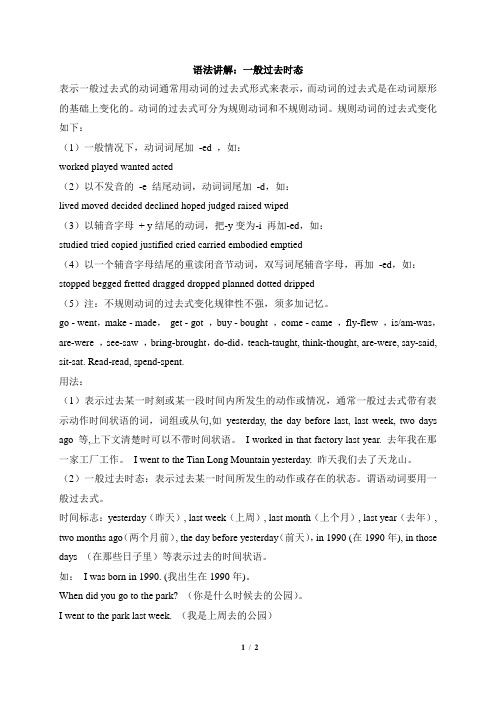
语法讲解:一般过去时态表示一般过去式的动词通常用动词的过去式形式来表示,而动词的过去式是在动词原形的基础上变化的。
动词的过去式可分为规则动词和不规则动词。
规则动词的过去式变化如下:(1)一般情况下,动词词尾加-ed ,如:worked played wanted acted(2)以不发音的-e 结尾动词,动词词尾加-d,如:lived moved decided declined hoped judged raised wiped(3)以辅音字母+ y结尾的动词,把-y变为-i 再加-ed,如:studied tried copied justified cried carried embodied emptied(4)以一个辅音字母结尾的重读闭音节动词,双写词尾辅音字母,再加-ed,如:stopped begged fretted dragged dropped planned dotted dripped(5)注:不规则动词的过去式变化规律性不强,须多加记忆。
go - went,make - made,get - got ,buy - bought ,come - came ,fly-flew ,is/am-was,are-were ,see-saw ,bring-brought,do-did,teach-taught, think-thought, are-were, say-said, sit-sat. Read-read, spend-spent.用法:(1)表示过去某一时刻或某一段时间内所发生的动作或情况,通常一般过去式带有表示动作时间状语的词,词组或从句,如yesterday, the day before last, last week, two days ago 等,上下文清楚时可以不带时间状语。
I worked in that factory last year. 去年我在那一家工厂工作。
八年级英语下册 Unit7 Topic1单词和配套练习 仁爱版
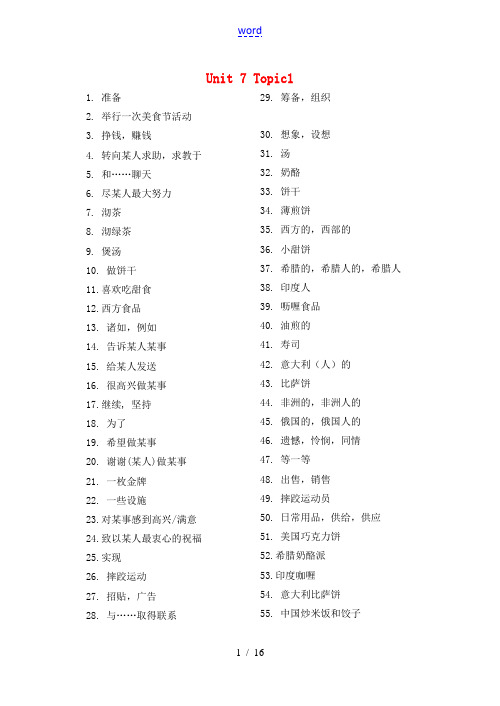
wordUnit 7 Topic11. 准备2. 举行一次美食节活动3. 挣钱,赚钱4. 转向某人求助,求教于5. 和……聊天6. 尽某人最大努力7. 沏茶8. 沏绿茶9. 煲汤10. 做饼干11.喜欢吃甜食12.西方食品13. 诸如,例如14. 告诉某人某事15. 给某人发送16. 很高兴做某事17.继续, 坚持18. 为了19. 希望做某事20. 谢谢(某人)做某事21. 一枚金牌22. 一些设施23.对某事感到高兴/满意24.致以某人最衷心的祝福25.实现26. 摔跤运动27. 招贴,广告28. 与……取得联系29. 筹备,组织30. 想象,设想31. 汤32. 奶酪33. 饼干34. 薄煎饼35. 西方的,西部的36. 小甜饼37. 希腊的,希腊人的,希腊人38. 印度人39. 呖喱食品40. 油煎的41. 寿司42. 意大利(人)的43. 比萨饼44. 非洲的,非洲人的45. 俄国的,俄国人的46. 遗憾,怜悯,同情47. 等一等48. 出售,销售49. 摔跤运动员50. 日常用品,供给,供应51. 美国巧克力饼52.希腊奶酪派53.印度咖喱54. 意大利比萨饼55. 中国炒米饭和饺子56. 日本寿司58. 俄罗斯黑面包57. 南非咖喱牛肉Unit 7 Topic1AMaria: We know Daniel Igali wants to build a new school for his poorvillage in Nigeria.Jane: I think money must be a problem for him.K(Kangkang): Shall we 1 to raise money for his school?Jane: Good idea! 2 haveit?K: I think we can have it on our school playground on Sunday.Maria: I will 3 .Michael: My task is to make a poster.K: Go od! I’ll 4 Daniel on the Internet to get more information abouthim.Jane: I will think about how to organize the food festival.Maria: Great! Let’s 5 to make it successful.BJane: Hello, Michael! 1 cook for the foodfestival?M(Mi chael): I’m thinking about that. 2 ,and I think a lot of students will buy western food, such as Americanchocolate cookies and Greek cheese pies.Jane: Wow! That’s a good idea. I like Indian food, so I 3 Indian curries.K(Kangkang): Wonderful! I think Chinese fried rice and Japanese sushiare easy to cook. 4 , I’m sure that fried rice anddumplings will be popular.Maria: You’re right. But what should I serve, Italian pizza, South African beef curry or Russian black bread?K: I think beef curry is OK.M: That’s good enough. I believe we’ll 5 for Daniel Igali.CO(Operator): Hello! No.37 High School.K(Kangkang): Hello! Extension 6006, please.O: OK. 1 , please.U(Uncle Yang): (A few seconds later) Hello!K: Hello! Uncle Yang, this Kangkang.U: 2 ? Kangkang?K: We’re going to have an international food festival to raise money for a village school in Nigeria.3 ?U: What a surpris e! I’d love to. 4 ? K: On our school playground on May 16th. It’s Sunday. You must e to our food festival.U: OK. I’m pleased to hear that. 5 , Kangkang!Unit 7 Topic 1 Section AI.根据首字母提示填空1. Can I have another bowl of chicken s?2. He ordered an Italian c pizza.3. You can i how useful the fax machine is.4. He lives in a small v far away from the city.5. P is a kind of thin, dry cake.II.选择题1. Tomorrow I will get in touch my friends the Internet.A. at, inB. with, onC. to, onD. to, through2. He tries his best English well.A. to learnB. learnC. learningD. learns3. I think she will be here soon.A. whenB. while c. that D. if4. He is my good friend and I him.A. know aboutB. know ofC. knowD. know from5. I turn to our teachers when I’m in trouble.A. WillB. ShallC. WouldD. Would like6. I’m a new er, so I ask the driver go there.A. how toB. where toC. when toD. what toIII.从II 栏中找出与I栏相对应的答语I( ) 1. Do you know about him?( ) 2. Shall we have a party next Sunday?( ) 3. Do you think the children need to make cheese pies? ( ) 4. When and where shall we meet?( ) 5. How do you chat with your friends?IIA. No, I don’t think so.B. At the school gate tomorrowmorning.C. On the Internet.D. No, I don’t.E. Good idea!Section BI.用方框中所给单词的适当形式填空1. Everyone for the sports meet at the moment.2. Peter doesn’t like to eat curries.3. cultures are different from those in the east.4. I often invited my friends dinner.5. Would you like me up later on?6. chicken is very popular in America.7. — Thank you very much.. — It’s a .II.选择题1. What would you like to cook the food festival?A. onB. ofC. forD. at2. I often my hometown when I am in Beijing.A. think overB. think aboutC. thinkD. think of3. The book is for children to read. There are few new words in it.A. enough easyB. easy enoughC. enoughdifficultD. difficultenough4. We should the people.A. serve forB. serve toC. serveD. serve at5. —I’m sorry I lost your pen. —I have another one.A. Never mind.B. You’re weleC. That’s rightD. You must pay for it6. —I missed the wonderful sports meeting last week. —.A. How nice it is!B. I’m so sorry!C. What a pity!D. Sounds great!7. I her again three years later.A. will meetB. metC. am going to meetD. meet8. —Would you like to e to my party this Saturday?— Sure, .A. I’m afraid notB. but I’m sorry I can’tC. that’s good enoughD. I’d love toSection CI.根据汉语提示填空1. When it rains, the children in the classroom(全身淋湿)2. They are going to (举办美食节) next month.3. — Hello! Could I speak to Tom, please?—(请稍等)), please. He is ing soon.4. You are making progress. (继续努力)the good work., Kangkang.5. Wele to our store! We have many different things(出售).II.选择题1. — Hello! . — Just a minute.A. That is Li Ming.B. Can I speak to Mrs. Wang, please?C. Who is this?D. I am Mr. Han.2. Thank you me the news.A. to tellB. to tellingC. for tellD. for telling3. I’m very to see you again.A. pleaseB. pleasureC. pleasedD. pleasing4. The worker works hard make a lot of moneyA. in orderB. in order toC. on order thatD. so that5. Don’t stop. Please keep .A. runningB. runC. to runD. runs6. — We should do something to help the poor children. What about money for them? — That would be very nice.A. raiseB. riseC. raisingD. rising7. — We’ll have an Englishevening party on Christmas day. May Iinvite you to e? —I’d love to.A. How surprised!B. How bored!C. How boring!D. What a surprise!8. The school in my village has only a few school .A. suppliesB. supplyC. supplyingD. to supplyIII.从方框中选择适当的选项补全对话T(Tony): Hello, Nancy!N(Nancy): Hi, Tony! T: 1 ?N: I Think so. What ’s up?T: 2 ? There ’s a new restaurant near the station.N: I’d love to, but I’m sorry I can ’t. 3 .T: Oh, that ’s too bad. 4 ?N: Sunday? Let me see. Yes, I think I will be free.T: Great. When shall we meet?N: At six o ’clock, OK? T: Sounds great. 5 .N: All right. See you then.T: See you.IV .完形填空When Italians talk about their cooking to foreigners, they always think of pizza 1 . But today ’s pizza is different 2 the old ones. In the past, it was hard to make pizza. 3 years went by, the 4 used a new way to make pizza. Then it was 5 to make pizza.A long time ago, there were several kingdoms in Italy. 6 , they became one country. During this time, Italians got some new ideas 7 cooking. The most interesting idea was to make pizza. The first pizza was not so delicious and did not look nice. 8 the cooks in Italy tried to make it better. Then this kind of food began to look nice and taste delicious soon it became popular around the country. Most people liked it because it was 9 , nourishing (富有营养的),simpleto make and nice to eat.Now Americans eat more pizza than 10 do every day. Maybe many people in China are enjoying pizza as a meal. Do you like it?1. A. first B. firstly C. for the first time D. at first2. A. / B. with C. from D. in3. A. With B. From C. In D. As4. A. cook B. cooks C. cooker D. cookers5. A. easiest B. easier C. easily D. more easily6. A. Later B. Latest C. Late D. Lately7. A. on B. for C. as D. by8. A. But B. Because C. Why D. So9. A. dear B. cheap C. dearer D. cheaper10. A. Chinese B. Italians C. Australians D.JapaneseSection DI.根据首字母或汉语提示填空1. May I i you to my birthday party?2. We can s many kinds of cookies to customers in our restaurant.3. I wish your food festival a big s!4. I’m afraid he (没空).5. Let’s make his dream (实现).II.用所给单词的适当形式填空1. Thank you for (help) me with my English.2. Let’s try our best (not make) our teacher angry.3. What about (buy) a sandwich for him?4. You can make an (invite) to them.5. Five minutes later he (leave) for Beijing.III.选择题1. Look! The little baby his mother.A. looksB. looks likeC. likeD. is looking2. He imagined basketball with Tom on the playground.A. playB. playedC. playingD. to play3. Keep , and you will be .A. to try, successB. trying, successC. to try, successfulD. trying, successful4. — This is Xiao Wu speaking. Is Tom in? — the line, please.A. HoldB. KeepC. GetD. Take5. — I’m pleased his work. What about you? — I’m proud him.A. with, withB. at, aboutC. with, ofD. about, for IV.阅读理解根据广告内容,完成下列各题1. The Happy Holiday Hotel stands at .2. Maria wants a double room for three days at Blue Sky Hotel, so she should pay .3. Restaurants at the Happy Holiday Hotel open .4. If Maria wants to ride a horse, she should call .5. The double rooms at the Blue Sky Hotel are more expensive because they have .Unit 7 Topic 1 自测题I.词汇A.根据汉语提示填空1. Can you sing a song in (俄语).2. We have lots of (学校用品)here.3. The lazy boy passed the exam. What a (令人吃惊的).4. Mary studies hard (为了)go to college.5. The students are (为……做准备)theirEnglishpetition.B.选出与句中画线部分意思相同或相近的选项6. Hold the line, please.A. Wait for meB. Hold onC. Hands upD. Write a message7. Shall we have a food festival?A. hasB. hadC. holdD. held8. Let’s try our best to study English well.A. doB. makeC. didD. made9. I shall turn to our teachers.A. help our teachersB. turn to helpC. ask our teacher for helpD. help myself10. Ihave a sweet tooth.A. have a good toothB. like eating sweet foodC. make my tooth sweetD. like my teethII.选择题1. That crying baby is to see his mother.A. pleaseB. pleasingC. pleasesD. pleased2. Mary tells her mother she will her a letter when she gets to London.A. sendB. send forC. send offD. send out3. I believe we’ll raise a lot of money for Daniel Igali.A. thatB. whatC. ifD. when4. He works hard and tries his best to make his dream .A. e onB. e outC. e trueD. e over5. The twins are making a for the food festival.A. postB. posterC. inviteD. invitation6. Linda plans to cook pizza.A. ItaliansB. ItalyC. ItaliesD. Italian7. I’m thinking about to do on New Year’s Day.A. howB. whatC. whenD. where8. This village school is very small and has few .A. classroomB. deskC. supplyD. supplies9. Mary decide go shopping with her parents.A. not toB. didn’tC. doesn’tD. isn’t to10. When it rained, we all wet.A. becameB. turnedC. changedD. got11. I’m very pleased with you will do for me.A. whatB. whereC. whenD. how12. Would you like to have dinner with me ?A. in this Sunday eveningB. on this Sunday eveningC. at this Sunday eveningD. this Sunday evening13. Please give my to your friends.A. hopeB. wishC. hopesD. wishes14. The maths problem is a little difficult. Please .A. think of itB. think it ofC. think it overD. think over itIII.从方框中选择适当的选项补全对话Ann: Good afternoon, Tom!Tom: Good afternoon. I’m glad that you have e on time.Ann: Happy birthday to you, Tom 1Tom: Thanks a lot. What’s in it? 2 Oh! Wonderful! Chinese noodles, my favorite food.Ann: Yes, this kind of noodles is made for birthday. We eat noodles on birthday, because they are the symbol(象征)of longevity(长寿). Tom: Is that so? 3Ann: 4 And hope you make more progress(进步)with your study. Tom: 5IV.完形填空An important question about eating out is who pays for the meal. If a friend of yours asks you to have lunch with him, you may say 1 like this, “I’m afraid it’ll have to be someplace 2 , as I have very little money.” The other person may say, “OK, I’ll meet you at McDonald’s.”This means that the two agree to go Dutch, that is, each person pays for himself. He may 3 say, “Oh, no. I want to 4 you to lunch at Smith’s .”or “I want you to try Chinese dumplings there. They’re great.”This means the person wants to pay for both of you. If you feel 5 towards this person, you can go with him and you 6 pay for the meal. You may just say “ 7 . That would be very nice.”American customs(习俗)about who pays for dates(约会)are much the same as those in the other parts of the world. In the old days,American women wanted men to pay for all the meals. But today, a university girl or a woman in8 will usually pay her way during the day. If a man asks her fora dance outside the working hours, it 9 “e as my guest.”S o as you can see, it is a polite thing to make the question 10 at the very beginning.1. A. something B. anything C. everything D. nothing2. A. expensive B. cheap C. quiet D. wonderful3. A. also B. neither C. too D. either4. A. get B. bring C. meet D. take5. A. kind B. friendly C. happy D. lucky6. A. can’t B. needn’t C. mustn’t D. don’t7. A. I’m sorry B. Excuse me C. Thank you D. Pardon8. A. school B. China C. America D. business9. A. goes B. says C. means D. tells10. A. clear B. careful C. clean D. easyV.阅读理解ABob likes to eat spaghetti(意大利面条). Every Friday he goes to an Italian restaurant and eats spaghetti for lunch.Phyllis is a waitress(女服务生)at the Italian restaurant. Phyllis and Bob always talk and laugh. They bee good friends.After Bob ate spaghetti at the restaurant. He paid for his lunch. Then he asked Phyllis, “Do you want a tip today, or do you want half of my lottery ticket(彩票)?”“Half of your lottery ticket?”Phyllis asked. “Yes,”Bob said, “I have a lottery ticket. If I win the lottery, you will get half of the money.”Phyllis laughed. “OK,” she said, “I don’t want a tip today.I want half of the lottery money!” She laughed again.The next day, Bob won the lottery. He won six million dollars. Bob went to the Italian restaurant. “Here is your tip,” Bob told Phyllis.1. Where does Bob go every Friday?A. To his friend’s restaurant.B. To an Italian restaurant.C. To his friend’s house.D. To a restaurant to talk with his friend.2. Who is Phyllis?A. Bob’s friend.B. Bob’s wife.C. A waitress.D. Both A and C.3. How much money did Bob give to Phyllis?A. 3,000,000 dollars.B. 300,000 dollars.C. 6,000,000 dollars.D. Some of the money.4. From the last passage, we know Bob is .A. smartB. honestC. luckyD. happy5. Which of the following is TRUE?A. Bob eats spaghetti for lunch every day.B. Bob gives Phyllis money to buy lottery ticket.C. If Bob doesn’t win the lottery, Phyllis won’t get the tip for that day.D. Phyllis doesn’t want the tip because they’re friends.BDo you know the benefits(益处)of potatoes? 12 Africa is the hometown of potatoes. Later potatoes were grown all over the world. First people only ate them uncooked. 34 Men and women, young and old enjoy eating them very much. It is said that potatoes can be cooked into 400 kinds of cooked vegetables.In the past some people thought they could make people fat and were afraid of eating them too often. But in fact, they do not make people fat but keep people thin. 5根据短文内容,用选项把空缺的句子还原A. As the time passed, people learned to cook them deliciously.B. It is nearly the king of all vegetables and all foods.C. Now potatoes have bee delicious food or cooked vegetables at table.D. So you can enjoy them as often as possible if you like,E. As we know, people were first grown in Africa.Unit 7 Topic1 参考答案Section AI. 1. soup 2. cheese 3. imagine 4. village 5. PancakeII. 1. B 2. A 3. C 4. A 5. B 6. AIII. 1. D 2. E 3. A 4. B 5. CSection BI. 1. is preparing 2. Indian 3. Western 4. to have5. to call6. Fried7. pleasureSection CI. 1. all get wet 2. hold/have a food festival 3. Hold on4. Keep up5. for saleII. 1. B 2. D 3. C 4. B 5. A 6. C 7. D 8. AIII. 1. C 2. E 3. D 4. A 5. BIV. 1. A 2. C 3. D 4. B 5. B 6. A 7. A 8. D 9. B 10. B Section DI. 1. invite 2. supply 3. success 4. has no time 5. e true II. 1. helping 2. not to make 3. buying 4. invitation 5. left III. 1. B 2. C 3. D 4. A 5. CIV. 1. Tianchang Road 2. 120 yuan/¥120 3. 24 hours4. 0858-********5. bathroomsUnit 7 Topic 1 自测题I. A. 1. Russian 2. school supplies 3. surprise 4. in order to5. preparing forB. 6. B 7. C 8. A 9. C 10. BII. 1. D 2. A 3. A 4. C 5. B 6. D 7. B 8. D 9. A10. D 11. A 12. D 13. D 14. CIII. 1. C 2. A 3. E 4. D 5. BIV. 1. A 2. B 3. A 4. D 5. B 6. B 7. C 8. D 9. A 10. AV. A. 1. B 2. D 3. A 4. B 5. CB. 1. B 2. E 3. A 4. C 5. D。
Unit 7 topic 1重点单词 词组和句子

Unit 7 topic 1 知识点一.单词1.招贴;广告poster2.筹备raise3.想象imagine4.汤soup5.奶酪cheese6.饼干biscuit7.薄煎饼pancake8.西方的western9.小甜饼cookie10.希腊人Greek11.印度人Indian12.咖喱食品curry13.油煎的fry14.非洲人African15.俄罗斯人Russian16.同情pity17.出售sale18.供给,供应supply二.短语1.了解know about2.举办美食节have/hold a food festival3.筹钱raise money4.向某人求助 turn to /ask for help5.制作一张海报make a poster6.与某人在网上联系get in touch with sb on the Internet7.考虑think about8.尽力做某事try to do sth9.喜欢吃甜食have a sweet tooth10.此外what’s more11.足够的好good enough12.西方食品western food13.以后later on14.筹备美食节organize the food festival15.不用谢It’s a pleasure.16.非常乐意with please 17.送给某人某物send sb sth18.很遗憾What a pity19.没时间做某事have no time to do sth20.仅仅几个学校活动器材only a few school supplies21.更糟糕的是what’s worse22.对…满意be pleased with23.淋湿get wet24.其他每个地方everywhere else25.乐意做某事be pleased to do sth26.继续努力keep up the good work27.为了in order to28.稍等hold on29.多么令人吃惊What a surprise!How surprising!30.待售,出售for sale31.变成现实 come true三.句子。
七年级英语(仁爱版)下册Unit-7-Topic-1知识点练习

Unit7 Topic1一、词汇:1.have a birthday party__________________2.forget to do sth.__________________3.That’s a good idea!__________________4.be born__________________5.the shape of __________________6.I’m afraid…__________________7. I get it. __________________二、句型:1.Michael is talking about his favorite writer with Kangkang after class.①talk about 谈论,讨论They are talking about the weather in Fujian.②writer 作家,是名词,动词write 表示写作He likes writing , and he want to be a great writer.2.When is your birthday, Kangkang? ---- May13th.康康,你的生日是什么时候?①“when”可以就年、月、日和钟点进行提问,而“what time”只能就钟点进行提问。
②英语中日期有几种表示方法:a.月日,年,美国写法。
如:March 21st,2001 读作March the twenty-first, two thousand and oneb.日月,年,英国写法。
如: 21st March,2001读作the twenty-first of March, two thousand and one③介词on ,in和at放在时间前的用法:(1) on放在具体的时间或特指的时间前,如某天,某天的上午,下午或晚上,如:on August 18th,1980 在1980年8月18日on Sunday 在星期天on Saturday evening在星期六的晚上on a cold day 在一个寒冷的日子on Children’s Day在儿童节(2)in表示在一段时间,多放在年、月、季节等时间前,如:in summer在夏天in July在七月in the morning在早上(3)at用在某一时刻、年纪、夜晚、中午等时间前,如:at 8 o’clock在八点at night在夜晚at noon在中午at the age of ten 在十岁时3. What’s the date today? It’s May 8th.询问日期用What’s the date…?如:What’s the date the day afternoon?询问星期用What day…? 回答用It……如:What day is it today? It’s Wednesday.4. How do you plan to celebrate it?plan to do sth.计划做某事plan for sth.某事订计划They plan to have a birthday party for Kangkang.5. What’s the shape of your present?问形状:what is the shape of…= what shape is…What was the shape of it before?= What shape was it before?6.Sorry, I’m afraid you can’t.I’m afraid往往相当于I’m sorry, but…可用来引出带有歉意的句子,表求一种担忧,语气较缓和,如:I’m afraid I can’t come.(=I’m sorry, but I can’t come.)7. How long/ wide is it? 多长、多宽?---It’s…centimeters long/wide. …厘米长、宽。
八年级英语unit 7topic 1we are preparing for a food festival.仁爱版知识精讲

初二英语Unit 7:Topic 1:We are preparing for a food festival.仁爱版【本讲教育信息】一. 教学内容:Unit 7:Topic 1:We are preparing for a food festival.二. 教学重点、难点:(一)单词:△Nigeria ;n. 尼日利亚△wrestling n. 摔跤运动organize v. 组织successful adj. 成功的,有成就的imagine v. 想象,设想soup n. 汤biscuit n. 饼干pancake n. 薄煎饼cheese n. 干酪,奶酪pie n. 甜馅饼;水果馅饼;肉馅饼;蔬菜馅饼have a sweet tooth 喜欢吃甜食western adj. 西方的,西部的cookie n. 小甜饼Greek adj. 希腊的,希腊人的,希腊语的n. 希腊人,希腊语Indian adj. (美洲)印第安人的;印度人的n. 印度人;印第安人△curry ;n. 咖喱食品Italian adj. 意大利(人)的;意大利语的n. 意大利人;意大利语△pizza n. 比萨饼,意大利薄饼fried adj. 油煎的△sushi n. 寿司African adj. 非洲的,非洲人的n. 非洲人Russian adj. 俄国的,俄罗斯的;俄国人的;俄语的n. 俄语;俄国人△PRC=the People’s Republic of China 中华人民共和国Africa n. 非洲South Africa 南非Greece n. 希腊△Nigerian ;adj. 尼日利亚的n. 尼日利亚人△surprising adj. 令人惊奇的,使人吃惊的in order to 为了,目的是sincerely ;adv. 真诚地△wrestler n. 摔跤运动员supply n. & v. 补给,供给(二)词组:know about…了解,知道……情况be born in…出生在……make money 挣钱,赚钱turn to sb. for help 向某人求助chat with sb. 与某人聊天prepare for…为……准备have a sweet tooth 喜欢吃甜食think about 考虑decide to do sth. 决定做某事invite sb. to …邀请某人去(做)……plan to…计划做……keep up 持续不断in order to 为了be pleased with…对……中意,满足come true 实现(三)句型:[金点1]Shall we have a food festival to make money for his school? 我们举办一次美食节为他的学校挣点钱好吗?(1)have a food festival 举办美食节(2)make money 赚钱如:Mrs. Green wants to make money for her baby.格林太太想为她的孩子挣点钱。
仁爱英语八年级下册Unit-7-Topic-1-Section-A
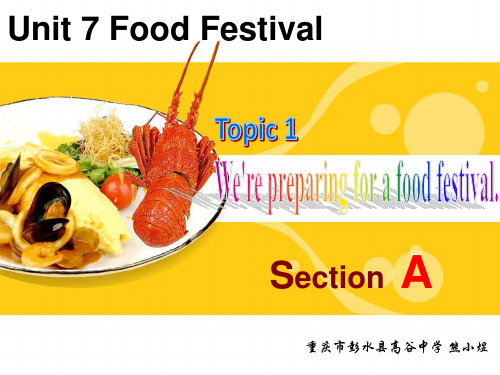
world.( T ) 4.Free the Children plans to build a school in Kenya.( T )
5.Kangkang will call Craig to get more information about
Thank You!
1b Listen to 1a and mark T(True) or F(False).
1.Craig is a twelve-year-old Canadian boy.( F )
2.Craig started Free the children to help poor
children.( T )
blind
adj.瞎的,失明的
In rural China, there are such a group of children——The Left-behind Children.Their parents go out to work in order to survive.They have to stay in the countryside, living with grandma and grandpa.They need our help.What can we do for them?Discuss and report your ideas to the class.The following information and pictures may help you.
Free the Children
Kenya
He is a very kind man. Now he is trying his best to build a new
〖2021年整理〗Unit7 Topic1 知识点总结

仁爱英语七年级下册Unit 7 To ing噢,你的生日就要到了。
be coming意为“就要来到了”,是现在进行时表示即将发生的动作。
come, go, eave, f等表示位置移动的动词,常用现在进行时表示即将发生的动作。
9 e你愿意来吗---Ye, I'd ove to Than ou是的,我很乐意。
谢谢。
woud ie to do… 想做……表示邀请的句型:I Woud ou ie to 动词原形2Wh not/don't ou动词原形3 What/How about v-ing4 Sha I we/Wi ou动词原形5 Wi ou动词原形6 Let’ 动词原形13 What' the ha afraid ou can't对不起,恐怕不行。
1)have a oo 看一看2)I'm afraid…意为“恐怕……”,是对对方请求的委婉拒绝方式。
--- Woud ou ie to go fihing with me---I'm afraid I can't I have too much wor to do17 ---What i it ie 它什么样?--- It i ie a fower 它像一朵花。
What be b ie 侧重于问人物性格。
--- What i our father ie你的父亲是一个什么样的人---He i friend 他很友善。
What do/doe b oo ie 侧重于问人物外貌。
--- What doe father oo ie 你父亲长什么样?--- He i ta and thin 他又高又瘦。
be ie有时候既问性格也问外貌。
oo ie和he ie中的ie均是介词;而动词ie就是喜欢的意思。
18 --- How ong/wide/… i it它有多长/宽--- It i 数字长度单位ong/wide/ta/ 它……厘米长/宽。
Unit7-Topic1知识点讲义2023-2024学年英语八年级下册

Unit 7Topic1 Section A1.Then shall we have a food festival and raise money to give to Free the Children?那我们举办一次美食节筹款来捐给“解放儿童”组织好吗?(1) have a food festival 意为“举办美食节”,也可用hold a food festival表达。
(2) Shall I/we... ? 在提供帮助、提出建议、要求给予和征求意见时,用Shall I(we)..?. 句型,意为“我(们) ....好吗?”。
如:Shall I open the window ?我把窗户打开好吗?[链接]①May I...? 常用于征求对方的意见,意为“我可以...吗?”。
如:②May I finish the homework after watching the game?我可以看完比赛后再完成作业吗?③May I e in ?我可以进来吗?④②Will you... ?常用于请求对方完成某一动作,同时征求对方意见,意为“请你....好吗?”。
如:⑤Will you please tell me something about yourself ?请你告诉我一些关于你自己的事情好吗?Will you...的否定形式为“Will you not+动词原形”。
如:Will you please not buy him toys ?请你不要给他买玩具,好吗?③ Would you like to.. ?常用于客气的建议或邀请,常意为“你想...吗?”。
如:Would you like to eat another mooncake ?你想再来一块月饼吗?2. I think we can have it on our school playground on Sunday.我想星期天我们可以在学校的操场举办美食节。
- 1、下载文档前请自行甄别文档内容的完整性,平台不提供额外的编辑、内容补充、找答案等附加服务。
- 2、"仅部分预览"的文档,不可在线预览部分如存在完整性等问题,可反馈申请退款(可完整预览的文档不适用该条件!)。
- 3、如文档侵犯您的权益,请联系客服反馈,我们会尽快为您处理(人工客服工作时间:9:00-18:30)。
Unit 7 Food FestivalTopic 1 We’re preparing for a food festivalSection A学习重点:初步掌握宾语从句的用法。
一、重点短语:have a food festivalraise money 集资,筹款,募捐turn to teacher 求助于老师get in touch withthink abouttry our bestmake it a successmake teaset the table 摆餐具;摆饭桌二、盘点提升1. Do you know about Craig Kielburger?区别:know about---了解,知道……的情况/ know--- 知道,认识,懂得练习: (1) I know her, she is our monitor.(2) He wants to know more about Chinese culture.2. He started Free the Children. 译:开办本句中,I think 是主句。
后面的宾语是一个陈述句充当宾语,这时主句和从句之间通常用that来引导,that通常被省掉了。
e.g.主语谓语引导词宾语4. I will turn to our teachers.turn to sb = ask sb for help请翻译下面的句子,并写出同义句。
Jim is going to ___________ ____________ his parents. Jim打算向他的父母求助。
turn to = Jim is going to _________ _________ ________ _________ ________.ask his parents for help拓展:in one’s turn to do sth轮到某人做某事。
轮到我扫地了。
译It’s __________ _________ ___________ sweep the floor. my turn toin turn = take turns我们轮流做家务。
We __________ __________ ____________ do housework.take turns to=We do housework __________ ___________. in turns5. I’ll get in touch with Craig Kielburger on the Internet to get more information about him.1) get in touch with sb. 与某人取得联系。
e.g Mary will ______ _____ _______ ________her parents as soon as she gets to Beijing .玛丽一到北京就将和她的父母取得联系。
get in touch with拓展:keep in touch with . 与某人保持联系。
他们经常通过电子邮件来保持联系。
They often _______ _______ ________ _______ each other by E-mail.keep in touch with2) to get more information about him. 是动词不定式作目的状语。
get sth. about sb. 获取关于某人的信息我可以从这本书上获取关于他的一些信息。
I can _________ _________ ___________ __________ him from the book.get some information about6. I will think about how to hole the food festival. 我来考虑如何举办这个美食节。
think about 考虑think…over 仔细思考think of 认为(选词填空)a.---Dad, will you buy me a new bile?---I don’t know. I am going to _______ ________ it. think aboutb. The question is so difficult for me. I’d like more time to _______ it ________. think overc. What do you ______ ______ your new neighbor? think of7. Let’s try our best to make it a success.1)successWe are surprised by his success.拓展success 作“一件(个)成功的事(人)” a success。
如:e.g. Jack is a success as a soccer player. 作为一名足球队员,杰克是成功。
2)try one’s best = do one’s best “尽某人最大力量”。
无论做什么,你都要竭尽全力。
Whatever you do, you will ________ __________ _______.try your best 她尽力帮助我。
She ________ _________ _________ ________ help me. tries her best to =She ________ _________ _________ ________ help me. does her best toe.g. I imagine (that) he will be late. 我想他要迟到了。
拓展;imagine 的常见用法是imagine doing sth. 和imagine sb. doing sth.。
e.g. He imagined walking into the office and asking some questions.他想象着自己走进办公室,问一些问题。
Can you imagine George cooking sinner?你能想象乔治做饭的情景吗?9. ---Do you think (that) the children need to make tea?---Yes, I think so. /No, I don’t think so. 是的,我也这么认为。
/ 不,我不那么认为。
1)含有宾语从句的主从复合句,对主句提问即可变成一般疑问句。
I know that he is very rich.Do you know he is very rich?2)Do you think (that) + 宾语从句的答语通常是:Yes, I think so. (肯定回答)No, I don’t think so. (否定回答)e.g. ---Do you think (that) he is very rich?---_____________________(肯定回答) Yes, I think so.---_____________________(否定回答) No, I don’t think so.三、课堂达标测验。
Ⅰ. 单项选择(A )1. You can ________ your teachers if you are in trouble(麻烦).A. turn toB. find outC. look forD. find out( B ) 2. ---How well she is dancing!---Yes. We can’t __________ her legs were badly hurt two years ago.A. understandB. imagineC. seeD. know( C ) 3. Tomorrow I will get in touch ________ my friends ________ the Internet.A. to; thoughB. at ; inC. with ; onD. to ; on( A ) 4. I think _________ she will be here soon.A. ifB. whenC. whileD. that( C ) 5. He tries his best ___________ English well.A. learningB. learnsC. to learnD. learnⅡ. 翻译1. 当我们有麻烦时,可以向警察求助。
When we are in trouble, we can _________________________________.(同义句)turn to the police= We can _____ _______ ________ _________ __________ when we are in trouble.ask the police for help2. 你不能想象我昨天有多高兴。
You can _______ _______ how ________ I was yesterday. not imagine happy3. 当你到重庆后,请一定与我取得联系。
get in touch with meYou must __________ _________ ______ ________ _______ when you get Chongqing.4. 昨天该Linda 擦黑板。
is Linda’s turn toIt ______ ________ _________ __________ clean the blackboard.5. 我知道Lily 没有通过考试。
I __________ __________ Lily ________ _________ __________ ___________.know …that didn’t pass the testSection B一、重点和难点that 引导的宾语从句的一般疑问句和特殊疑问句的变化,以及回答。
二、重点词组have a sweet tooth western foodchocolate cookies 巧克力曲奇cheese pie奶酪派Indian food Indian curries 印度咖喱Chinese fried rice 中国炒米饭Japanese sushi 日本寿司Italian pizza 意大利比萨饼South African beef curry 南非咖喱牛肉Russian black bread 俄罗斯黑面包good enoughWhat’s moreNever mindlater on三、盘点提升1. What would you like to cook for the food festival?would like = want (ˇˍˇ) 想,想要would you like …常用来提出建议。
